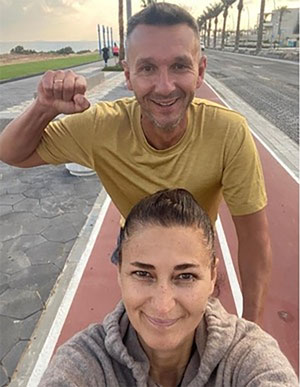Given just months to live, courageous Christian missionary says 'sharing Gospel' most important thing

LOVES PARK, Ill. -- A Ukrainian couple facing their own life-and-death battle with advanced cancer are helping others suffering from anxiety and despair on the frontline of the Israel-Hamas war.
Ukrainian-born Jew Yura, 51, and his wife Luda, 53, who has undergone major surgeries and multiple rounds of chemotherapy to treat Stage 4 cancer, left Ukraine to live in Israel, only to find themselves facing Hamas' rockets — and a devastating medical diagnosis.
Initially, doctors gave Luda only 3-6 months to live. But she has defied expectations, with doctors saying her condition is currently stable — a "miracle" that she attributes to answered prayer.
The couple — their last name withheld for security reasons — serve as Christian missionaries supported by U.S.-based Slavic Gospel Association (SGA, www.sga.org) in the Israeli city of Ashkelon, just 8 miles from Gaza. Ashkelon has come under attack since the war started last October.
"Despite her illness, Luda bravely comes with me everywhere," said Yura, the pastor of a Russian-speaking evangelical church in Ashkelon. "She helps serve food to those affected by the war, and shares God's love with others who are homeless, anxious, and suffering great distress."
While undergoing cancer treatment, Luda encouraged other women going through the same or similar struggles, giving them hope. "I pray that God will give me strength to go through these trials and, most importantly, keep on sharing the Gospel," she said.
And despite their own crisis, Yura and Luda have started a new church.
Since October, SGA-supported evangelical churches in Israel, including theirs, have supplied more than 200,000 free meals to Israelis reeling from shock and grief, some left homeless by the terrorist attacks.
Jews See Christians in Different Light
The grassroots aid effort is helping to change perceptions of evangelical Christians in Israel, who are often viewed with skepticism and indifference by the secular Jewish majority, according to Eric Mock, SGA's senior vice president.
"Roughly a third of Israelis are Russian-speaking Jews from the former Soviet countries, including thousands of immigrants from Ukraine," Mock said. "I see the same thing in Israel now that I see in Ukraine. People are in the pit of despair. There is no normalcy in the midst of the craziness."
Israelis are searching for "something solid to cling on to," Mock said. "They're asking, 'Where's the hope?' Everything around them is sinking. But the church is a rock of stability, and that's drawing people.
"Some evangelical churches have doubled in size since the war began."
Oleg Korotky, another SGA-supported Ukrainian-Israeli pastor and Bible college teacher, said the crisis has spurred Israel's Russian-speaking evangelicals to become "more active," quickly coming to the aid of their fearful neighbors and sharing the Gospel with them.
"The war has opened not only the doors to their apartments, but also their hearts," Korotky said. "Many people have realized that it was Christians who came to help them. It was Christians who brought them hope. Many people are rethinking their attitude toward Christianity."
Funded by U.S. donors, SGA has supported Russian-speaking evangelical churches in Israel for decades, training local missionary pastors and equipping them to help the "forgotten," including orphans, widows, the homeless and addicts, and share the Gospel with them.
---------------------------
Founded in 1934, Slavic Gospel Association (SGA, www.sga.org) helps "forgotten" orphans, widows and families in Ukraine, Russia, the former Soviet countries of Eastern Europe, Central Asia, and Russian-speaking immigrants in Israel – caring for their physical needs and sharing the life-transforming Gospel. SGA supports an extensive grassroots network of local evangelical missionary pastors and churches across this vast region.
SOURCE Slavic Gospel Association (SGA)
















